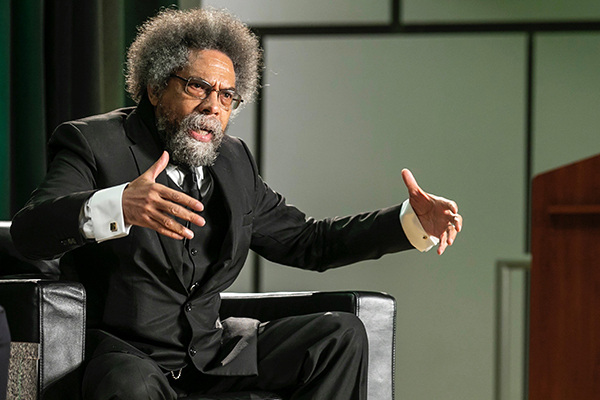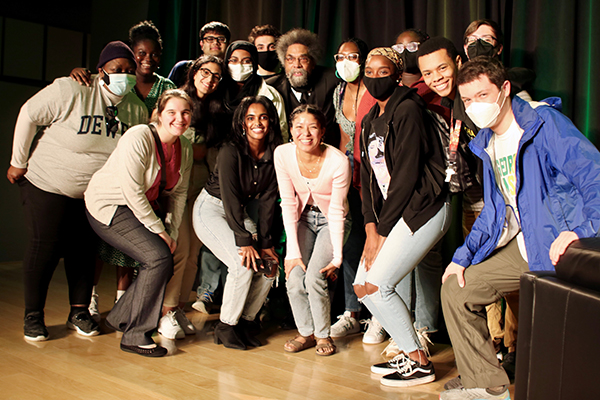In This Story

Cornel West promised to talk about “the center of the deep crisis that America finds itself in,” and the longtime philosopher, academic, and social activist did not disappoint.
West spoke for more than two hours in a conversation moderated by Schar School of Policy and Government Associate Professor Michael K. Fauntroy on Thursday, April 14, before an audience of more than 150 at George Mason University’s Van Metre Hall auditorium at Mason Square (formerly the Arlington Campus).
A video of the conversation is here.
The appearance, the first in-person event hosted by the Schar School’s new Race, Politics, and Policy Center, directed by Fauntroy, opened with remarks from Schar School Dean Mark J. Rozell and an introduction by George Mason Provost and Executive Vice President Mark R. Ginsberg, who teed things up for West’s penetrating observations on contemporary society by citing Mason’s renowned majority-minority population and its diversity being “a core virtue.”
If there is an easier guest to interview before a live audience, it’s difficult to imagine. For his part, Fauntroy gamely asked insightful questions that were answered with rhythmically imparted, free-flowing, and trenchant responses that reflected a musical cadence, not surprising given West’s love of jazz, which he referenced often. It was a master class in compelling oratory.
If an answer seemed to go a few measures too far, West, who was dressed in his trademark Edwardian-style black suit and tie, was aware. “I know I am going on too long, my brother,” he said to Fauntroy at one point, “but that is the beginning of my answer.” The line brought a laugh.
Fauntroy began the evening addressing the 68-year-old West’s “origin story,” during which West recounted being born in Oklahoma, “in the same hospital as the [soul group] GAP Band, in Greenwood. You know the name of the band stands for Greenwood, Archer, and Pine Band.”
Greenwood, West then reminded the audience, was the scene of the 1921 massacre that killed some 300 people and destroyed what was once “the Black Wall Street.”
The long-time academic—he currently serves as the Dietrich Bonhoeffer Professor of Philosophy and Christian Practice at Union Theological Seminary in New York City—addressed the current state of higher education, pointing out the difference between “education and schooling. Did you go to college, or did college go to you? Did you learn to think critically and to be yourself? Or did you get well-adjusted to injustice?”
Asked by Fauntroy about the teaching of hot-button issue critical race theory, West’s reply was simple and somber: “The reality is, the truth is too painful.”
On a lighter note, West recalled his days as an athlete, including winning a state championship in track, the memory of which brought a big smile to his face. As a baseball player, he said, “I wanted to be Willie Mays, not Mickey Mantle,” the difference being Mays’ admirably playful style of catching and throwing, which he happily demonstrated from his seat.
Well into his conversation, a remark made by Provost Ginsberg in his introduction came to West’s mind. “’Access to excellence,’” he said, repeating the university’s signature slogan. “Access to excellence…A center for race, and politics, and policy.
“There is something special happening at George Mason University,” he concluded.

